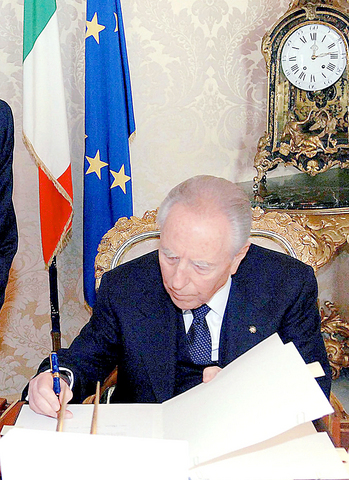Italy dissolved its parliament on Saturday and scheduled elections for early April, opening what promises to be a bitter campaign that pits Italian Prime Minister Silvio Berlusconi against a strong center-left opponent.
The government set the dates during a Cabinet meeting minutes after the Italian president signed a decree that dissolved parliament, ending a five-year legislature.
The election dates of April 9-10 had been agreed upon in previous weeks between Berlusconi and the president, Carlo Azeglio Ciampi. Opposition leaders had also signed off on the date.

PHOTO: EPA
Parliament ended two weeks later than originally planned, after Berlusconi negotiated a delay that allowed his government to rush through a flurry of last-minute legislation.
It also allowed the premier to keep up a barrage of TV and radio appearances, which will be limited during official campaigning because of rules that give competing coalitions equal air time.
``I'll be able to rest a bit,'' Berlusconi said, speaking on a talk show late Friday.
He seemed to do no such thing on Saturday, appearing before supporters in the central Italian city of Ancona on the Adriatic Sea and saying, among other things, that ``I fight against communism the way Churchill fought against Nazism,'' according to Italian news agency reports.
He also made fun of his opponent Romano Prodi, telling a joke in which a genie in a lamp tells Prodi it is easier to grant his request for peace in the Middle East than his request for intelligence.
Despite the media blitz, opinion polls have consistently indicated that the center-left bloc headed by Prodi, a former premier and former European Commission president, is leading the race by some five percentage points.
The government's popularity has been sliding amid the country's economic woes and political infighting.
But Berlusconi has expressed confidence that his media campaign will bear fruit, saying his own pollsters indicate the two blocs are virtually tied.
He said on Saturday that a poll done by a ``serious American firm'' that he did not name found that Berlusconi was ahead, according to comments reported by the ANSA and Apcom news agencies.
The election will be a rematch of the 1996 vote, which was won by Prodi.
``We need to change,'' Prodi told supporters on Saturday as he presented the center-left electoral platform in a Rome theater.
The center-left program includes a promise to quickly pull Italy's dwindling contingent out of Iraq in cooperation with Iraqi authorities and to continue working for the reconstruction of the country with a civilian force.
Prodi also vowed to kick-start Italy's economy, promising measures that would enable workers to take home more pay while curbing companies' costs, more investment in research and innovation and focus more on the problems of Italy's chronically underdeveloped south.
The center-left has said that if it wins the election it will seek to reverse many of Berlusconi's reforms.

Auschwitz survivor Eva Schloss, the stepsister of teenage diarist Anne Frank and a tireless educator about the horrors of the Holocaust, has died. She was 96. The Anne Frank Trust UK, of which Schloss was honorary president, said she died on Saturday in London, where she lived. Britain’s King Charles III said he was “privileged and proud” to have known Schloss, who cofounded the charitable trust to help young people challenge prejudice. “The horrors that she endured as a young woman are impossible to comprehend and yet she devoted the rest of her life to overcoming hatred and prejudice, promoting kindness, courage, understanding

‘DISRESPECTFUL’: Katie Miller, the wife of Trump’s most influential adviser, drew ire by posting an image of Greenland in the colors of the US flag, captioning it ‘SOON’ US President Donald Trump on Sunday doubled down on his claim that Greenland should become part of the US, despite calls by the Danish prime minister to stop “threatening” the territory. Washington’s military intervention in Venezuela has reignited fears for Greenland, which Trump has repeatedly said he wants to annex, given its strategic location in the arctic. While aboard Air Force One en route to Washington, Trump reiterated the goal. “We need Greenland from the standpoint of national security, and Denmark is not going to be able to do it,” he said in response to a reporter’s question. “We’ll worry about Greenland in

PERILOUS JOURNEY: Over just a matter of days last month, about 1,600 Afghans who were at risk of perishing due to the cold weather were rescued in the mountains Habibullah set off from his home in western Afghanistan determined to find work in Iran, only for the 15-year-old to freeze to death while walking across the mountainous frontier. “He was forced to go, to bring food for the family,” his mother, Mah Jan, said at her mud home in Ghunjan village. “We have no food to eat, we have no clothes to wear. The house in which I live has no electricity, no water. I have no proper window, nothing to burn for heating,” she added, clutching a photograph of her son. Habibullah was one of at least 18 migrants who died

Russia early yesterday bombarded Ukraine, killing two people in the Kyiv region, authorities said on the eve of a diplomatic summit in France. A nationwide siren was issued just after midnight, while Ukraine’s military said air defenses were operating in several places. In the capital, a private medical facility caught fire as a result of the Russian strikes, killing one person and wounding three others, the State Emergency Service of Kyiv said. It released images of rescuers removing people on stretchers from a gutted building. Another pre-dawn attack on the neighboring city of Fastiv killed one man in his 70s, Kyiv Governor Mykola